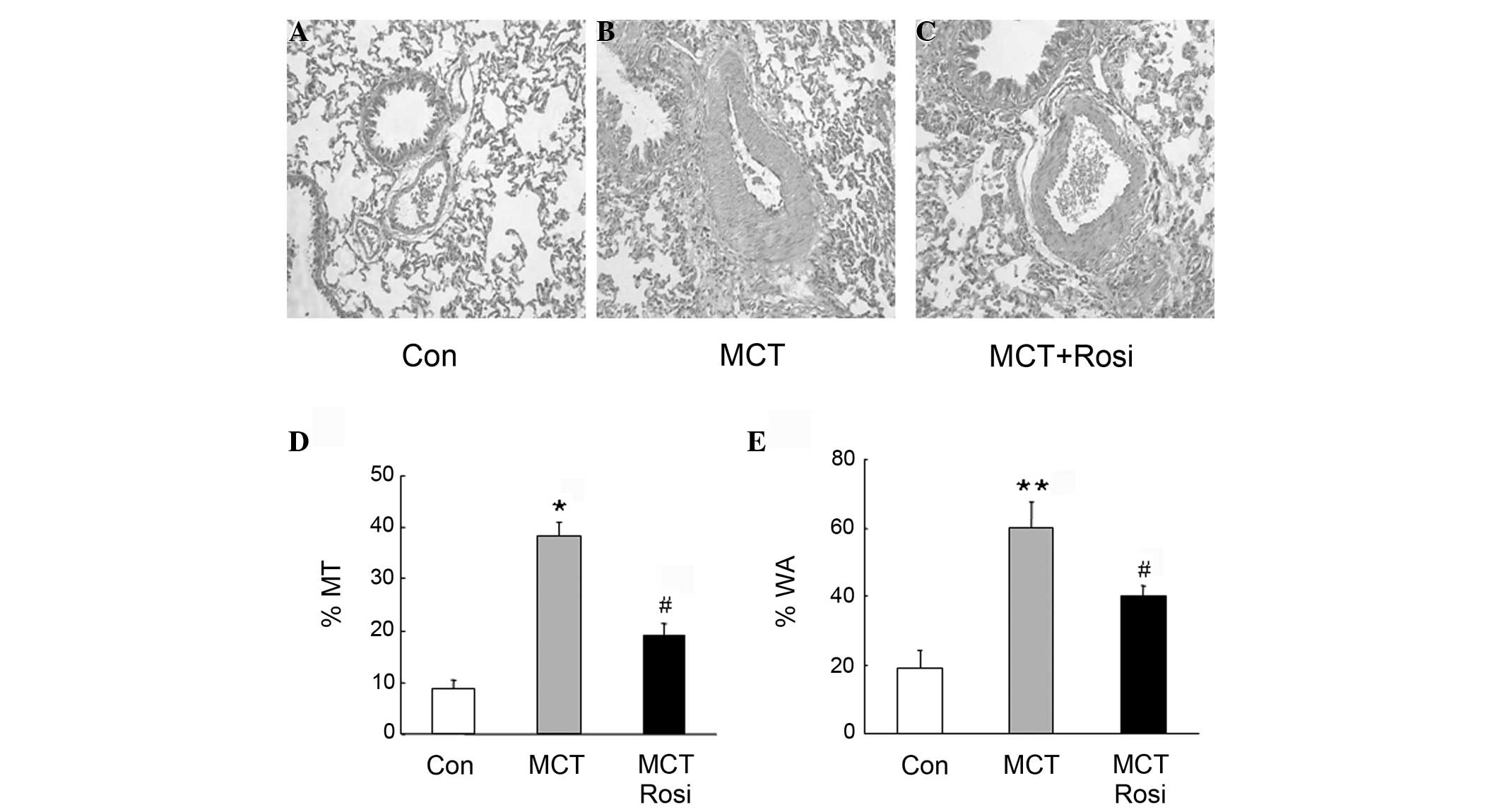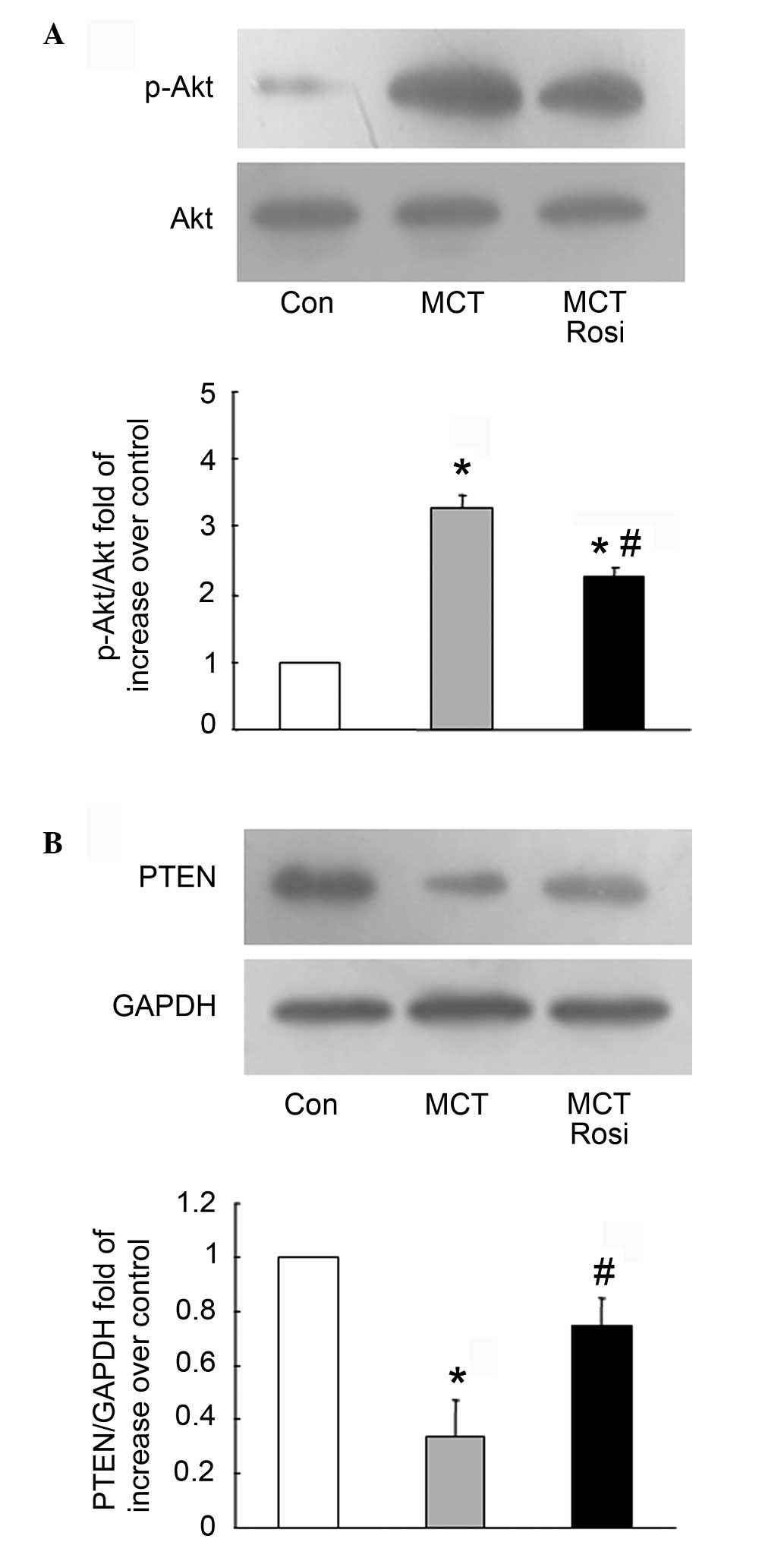|
1
|
Humbert M, Sitbon O and Simonneau G:
Treatment of pulmonary arterial hypertension. N Engl J Med.
351:1425–1436. 2004. View Article : Google Scholar : PubMed/NCBI
|
|
2
|
Martens FM, Visseren FL, Lemay J, de
Koning EJ and Rabelink TJ: Metabolic and additional vascular
effects of thiazolidinediones. Drugs. 62:1463–1480. 2002.
View Article : Google Scholar : PubMed/NCBI
|
|
3
|
Meng Y, Chen C, Tian C, Du J and Li HH:
Angiotensin II-induced Egr-1 expression is suppressed by peroxisome
proliferator-activated receptor-γ ligand 15d-PGJ2 in macrophages.
Cell Physiol Biochem. 35:689–698. 2015. View Article : Google Scholar : PubMed/NCBI
|
|
4
|
Gao D, Hao G, Meng Z, et al: Rosiglitzone
Suppresses Angiotensin II-Induced Production of KLF5 and Cell
Proliferation in Rat Vascular Smooth Muscle Cells. PLoS One.
10:e01237242015. View Article : Google Scholar : PubMed/NCBI
|
|
5
|
Nicola T, Ambalavanan N, Zhang W, et al:
Hypoxia-induced inhibition of lung development is attenuated by the
peroxisome proliferator-activated receptor-γ agonist rosiglitazone.
Am J Physiol Lung Cell Mol Physiol. 301:L125–134. 2011. View Article : Google Scholar : PubMed/NCBI
|
|
6
|
Jiang C, Ting AT and Seed B: PPAR-γ
agonists inhibit production of monocyte inflammatory cytokines.
Nature. 391:82–86. 1998. View
Article : Google Scholar : PubMed/NCBI
|
|
7
|
Morales-Garcia JA, Luna-Medina R,
Alfaro-Cervello C, Cortes-Canteli M, Santos A, Garcia-Verdugo JM
and Perez-Castillo A: Peroxisome proliferator-activated receptor γ
ligands regulate neural stem cell proliferation and differentiation
in vitro and in vivo. Glia. 59:293–307. 2011. View Article : Google Scholar : PubMed/NCBI
|
|
8
|
Kulkarni AA, Thatcher TH, Olsen KC,
Maggirwar SB, Phipps RP and Sime PJ: PPAR-γ ligands repress
TGFβ-induced myofibroblast differentiation by targeting the
PI3K/Akt pathway: Implications for therapy of fibrosis. PLoS One.
6:e159092011. View Article : Google Scholar : PubMed/NCBI
|
|
9
|
Nisbet RE, Bland JM, Kleinhenz DJ,
Mitchell PO, Walp ER, Sutliff RL and Hart CM: Rosiglitazone
attenuates chronic hypoxia-induced pulmonary hypertension in a
mouse model. Am J Respir Cell Mol Biol. 412:482–490. 2010.
View Article : Google Scholar
|
|
10
|
Ochoa CD, Yu L, Al-Ansari E, Hales CA and
Quinn DA: Thrombospondin-1 null mice are resistant to
hypoxia-induced pulmonary hypertension. J Cardiothorac Surg.
5:322010. View Article : Google Scholar : PubMed/NCBI
|
|
11
|
Wang LX, Sun Y, Chen C, Huang XY, Lin Q,
Qian GQ, Dong W and Chen YF: Effects and mechanism of oridonin on
pulmonary hypertension induced by chronic hypoxia-hypercapnia in
rats. Chin Med J (Engl). 122:1380–1387. 2009.PubMed/NCBI
|
|
12
|
Ismail S, Sturrock A, Wu P, Cahill B,
Norman K, Huecksteadt T, Sanders K, Kennedy T and Hoidal J: NOX4
mediates hypoxia-induced proliferation of human pulmonary artery
smooth muscle cells: The role of autocrine production of
transforming growth factor-{β}1 and insulin-like growth factor
binding protein-3. Am J Physiol Lung Cell Mol Physiol.
296:L489–L499. 2009. View Article : Google Scholar : PubMed/NCBI
|
|
13
|
Zhang D, Ma C, Li S, Ran Y, Chen J, Lu P,
Shi S and Zhu D: Effect of Mitofusin 2 on smooth muscle cells
proliferation in hypoxic pulmonary hypertension. Microvasc Res.
84:286–296. 2012. View Article : Google Scholar : PubMed/NCBI
|
|
14
|
Goncharova EA, Ammit AJ, Irani C, Carroll
RG, Eszterhas AJ, Panettieri RA and Krymskaya VP: PI3K is required
for proliferation and migration of human pulmonary vascular smooth
muscle cells. Am J Physiol Lung Cell Mol Physiol. 283:L354–L363.
2002. View Article : Google Scholar : PubMed/NCBI
|
|
15
|
Fenton TR, Nathanson D, Ponte de
Albuquerque C, Kuga D, Iwanami A, Dang J, Yang H, Tanaka K,
Oba-Shinjo SM, Uno M, et al: Resistance to EGF receptor inhibitors
in glioblastoma mediated by phosphorylation of the PTEN tumor
suppressor at tyrosine 240. Proc Natl Acad Sci USA.
109:14164–14169. 2012. View Article : Google Scholar : PubMed/NCBI
|
|
16
|
Ying H, Elpek KG, Vinjamoori A, Zimmerman
SM, Chu GC, Yan H, Fletcher-Sananikone E, Zhang H, Liu Y, Wang W,
et al: PTEN is a major tumor suppressor in pancreatic ductal
adenocarcinoma and regulates an NF-κB-cytokine network. Cancer
Discov. 1:158–169. 2011. View Article : Google Scholar : PubMed/NCBI
|
|
17
|
Zhang JG, Wang JJ, Zhao F, Liu Q, Jiang K
and Yang GH: MicroRNA-21 (miR-21) represses tumor suppressor PTEN
and promotes growth and invasion in non-small cell lung cancer
(NSCLC). Clin Chim Acta. 411:846–852. 2010. View Article : Google Scholar : PubMed/NCBI
|
|
18
|
Oudit GY and Penninger JM: Cardiac
regulation by phosphoinositide 3-kinases and PTEN. Cardiovasc Res.
82:250–260. 2009. View Article : Google Scholar : PubMed/NCBI
|
|
19
|
Oudit GY, Sun H, Kerfant BG, Crackower MA,
Penninger JM and Backx PH: The role of phosphoinositide-3 kinase
and PTEN in cardiovascular physiology and disease. J Mol Cell
Cardiol. 37:449–471. 2004. View Article : Google Scholar : PubMed/NCBI
|
|
20
|
Chen L, Monti S, Juszczynski P, Ouyang J,
Chapuy B, Neuberg D, Doench JG, Bogusz AM, Habermann TM, Dogan A,
et al: SYK inhibition modulates distinct PI3K/AKT- dependent
survival pathways and cholesterol biosynthesis in diffuse large B
cell lymphomas. Cancer Cell. 23:826–838. 2013. View Article : Google Scholar : PubMed/NCBI
|
|
21
|
De Luca A, Maiello MR, D'Alessio A,
Pergameno M and Normanno N: The RAS/RAF/MEK/ERK and the PI3K/AKT
signalling pathways: Role in cancer pathogenesis and implications
for therapeutic approaches. Expert Opin Ther Targets. 16:(Suppl 2).
S17–S27. 2012. View Article : Google Scholar : PubMed/NCBI
|
|
22
|
Moon SH, Kim DK, Cha Y, Jeon I, Song J and
Park KS: PI3K/Akt and Stat3 signaling regulated by PTEN control of
the cancer stem cell population, proliferation and senescence in a
glioblastoma cell line. Int J Oncol. 42:921–928. 2013.PubMed/NCBI
|
|
23
|
Conley-LaComb MK, Saliganan A, Kandagatla
P, Chen YQ, Cher ML and Chinni SR: PTEN loss mediated Akt
activation promotes prostate tumor growth and metastasis via
CXCL12/CXCR4 signaling. Mol Cancer. 12:852013. View Article : Google Scholar : PubMed/NCBI
|
|
24
|
Akca H, Demiray A, Aslan M, Acikbas I and
Tokgun O: Tumour suppressor PTEN enhanced enzyme activity of GPx,
SOD and catalase by suppression of PI3K/AKT pathway in non-small
cell lung cancer cell lines. J Enzyme Inhib Med Chem. 28:539–544.
2013. View Article : Google Scholar : PubMed/NCBI
|
|
25
|
Kitagishi Y and Matsuda S: Redox
regulation of tumor suppressor PTEN in cancer and aging (Review).
Int J Mol Med. 31:511–515. 2013.PubMed/NCBI
|
|
26
|
Monsalve FA, Pyarasani RD, Delgado-Lopez F
and Moore-Carrasco R: Peroxisome proliferator-activated receptor
targets for the treatment of metabolic diseases. Mediators Inflamm.
2013:5496272013. View Article : Google Scholar : PubMed/NCBI
|
|
27
|
Nickkho-Amiry M, McVey R and Holland C:
Peroxisome proliferator-activated receptors modulate proliferation
and angiogenesis in human endometrial carcinoma. Mol Cancer Res.
10:441–453. 2012. View Article : Google Scholar : PubMed/NCBI
|
|
28
|
O'Sullivan SE and Kendall DA: Cannabinoid
activation of peroxisome proliferator-activated receptors:
Potential for modulation of inflammatory disease. Immunobiology.
215:611–616. 2010. View Article : Google Scholar : PubMed/NCBI
|
|
29
|
Robinson E and Grieve DJ: Significance of
peroxisome proliferator-activated receptors in the cardiovascular
system in health and disease. Pharmacol Ther. 122:246–263. 2009.
View Article : Google Scholar : PubMed/NCBI
|
|
30
|
Stephen J, Delvecchio C, Spitale N,
Giesler A, Radford K, Bilan P, Cox PG, Capone JP and Nair P: PPAR
ligands decrease human airway smooth muscle cell migration and
extracellular matrix synthesis. Eur Respir J. 41:425–432. 2013.
View Article : Google Scholar : PubMed/NCBI
|
|
31
|
Wang H, Wu Q, Liu Z, Luo X, Fan Y, Liu Y,
Zhang Y, Hua S, Fu Q, Zhao M, et al: Downregulation of FAP
suppresses cell proliferation and metastasis through PTEN/PI3K/AKT
and Ras-ERK signaling in oral squamous cell carcinoma. Cell Death
Dis. 5:e11552014. View Article : Google Scholar : PubMed/NCBI
|
|
32
|
Crossno JT Jr, Garat CV, Reusch JE, Morris
KG, Dempsey EC, McMurtry IF, Stenmark KR and Klemm DJ:
Rosiglitazone attenuates hypoxia-induced pulmonary arterial
remodeling. Am J Physiol Lung Cell Mol Physiol. 292:L885–L897.
2007. View Article : Google Scholar : PubMed/NCBI
|
|
33
|
Zhang D, Wang G, Han D, Zhang Y, Xu J, Lu
J, Li S, Xie X, Liu L, Dong L, et al: Activation of PPAR-γ
ameliorates pulmonary arterial hypertension via inducing heme
oxygenase-1 and p21(WAF1): An in vivo study in rats. Life Sci.
98:39–43. 2014. View Article : Google Scholar : PubMed/NCBI
|
|
34
|
Nicol CJ, Adachi M, Akiyama TE and
Gonzalez FJ: PPARgamma in endothelial cells influences high fat
diet-induced hypertension. Am J Hypertens. 18:549–556. 2005.
View Article : Google Scholar : PubMed/NCBI
|
|
35
|
Hansmann G, de Jesus Perez VA, Alastalo
TP, Alvira CM, Guignabert C, Bekker JM, Schellong S, Urashima T,
Wang L, Morrell NW, et al: An antiproliferative
BMP-2/PPARgamma/apoE axis in human and murine SMCs and its role in
pulmonary hypertension. J Clin Invest. 118:1846–1857. 2008.
View Article : Google Scholar : PubMed/NCBI
|
|
36
|
Lu X, Bijli KM, Ramirez A, Murphy TC,
Kleinhenz J and Hart CM: Hypoxia downregulates PPARγ via an
ERK1/2-NF-κB-Nox4-dependent mechanism in human pulmonary artery
smooth muscle cells. Free Radic Biol Med. 63:151–160. 2013.
View Article : Google Scholar : PubMed/NCBI
|
|
37
|
Liu Y, Tian XY, Huang Y and Wang N:
Rosiglitazone Attenuated Endothelin-1-Induced Vasoconstriction of
Pulmonary Arteries in the Rat Model of Pulmonary Arterial
Hypertension via Differential Regulation of ET-1 Receptors. PPAR
Res. 2014:3740752014. View Article : Google Scholar : PubMed/NCBI
|
|
38
|
Kang BY, Park KK, Green DE, Bijli KM,
Searles CD, Sutliff RL and Hart CM: Hypoxia mediates mutual
repression between microRNA-27a and PPARγ in the pulmonary
vasculature. PLoS One. 8:e795032013. View Article : Google Scholar : PubMed/NCBI
|

















